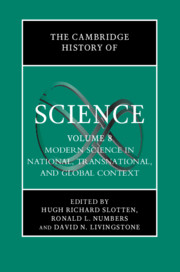Book contents
- The Cambridge History of Science
- The Cambridge History of Science
- The Cambridge History Of Science
- Copyright page
- Contents
- Notes on Contributors
- General Editors’ Preface
- 1 Introduction
- Part I Transnational, International, and Global
- Part II National and Regional
- Europe
- 11 United Kingdom
- 12 France: During the Long Nineteenth Century
- 13 France: Post-1914
- 14 Germany
- 15 Russia and the Former USSR
- 16 Low Countries
- 17 Scandinavia
- 18 Italy
- 19 Spain
- 20 Greece
- 21 Portugal
- 22 Europe: A Commentary
- Africa, the Middle East, and South Asia
- East and Southeast Asia
- United States, Canada, Australia, New Zealand, and Oceania
- Latin America
- Index
12 - France: During the Long Nineteenth Century
from Europe
Published online by Cambridge University Press: 21 March 2020
- The Cambridge History of Science
- The Cambridge History of Science
- The Cambridge History Of Science
- Copyright page
- Contents
- Notes on Contributors
- General Editors’ Preface
- 1 Introduction
- Part I Transnational, International, and Global
- Part II National and Regional
- Europe
- 11 United Kingdom
- 12 France: During the Long Nineteenth Century
- 13 France: Post-1914
- 14 Germany
- 15 Russia and the Former USSR
- 16 Low Countries
- 17 Scandinavia
- 18 Italy
- 19 Spain
- 20 Greece
- 21 Portugal
- 22 Europe: A Commentary
- Africa, the Middle East, and South Asia
- East and Southeast Asia
- United States, Canada, Australia, New Zealand, and Oceania
- Latin America
- Index
Summary
Historical studies of French science during the nineteenth century have been dominated by three recurring themes that echo the traditional polemical preoccupations of French scientists themselves. First, there has been a focus on the administrative centralization of French science under the aegis of the state. Related to this structural centralization has been a second issue, that of geographical centralization: the concentration of resources, manpower, and influence in Paris at the expense of the provinces. And finally there is the question of the relations between these two factors and a perceived view of scientific decline, or at least of a relative decline, manifested as a sense of failure to maintain the position of international leadership to which the French scientific community has commonly aspired, and even in some cases that it thought to be its due.
- Type
- Chapter
- Information
- The Cambridge History of Science , pp. 192 - 216Publisher: Cambridge University PressPrint publication year: 2020

